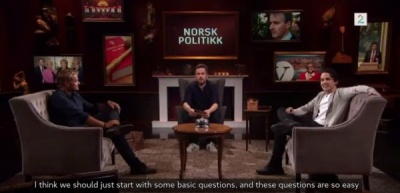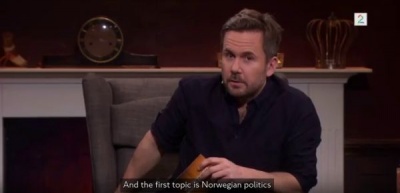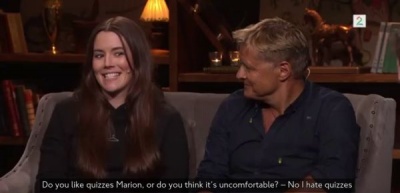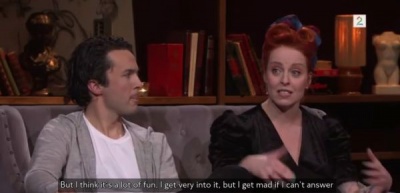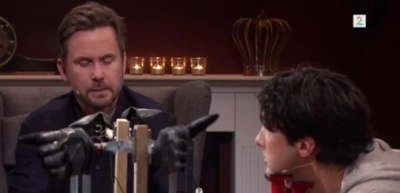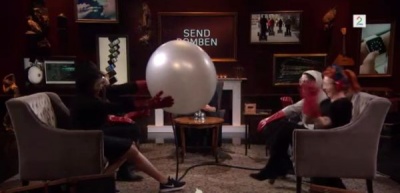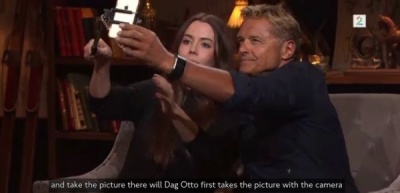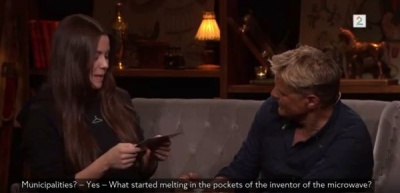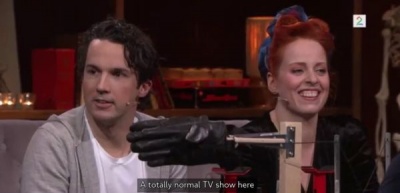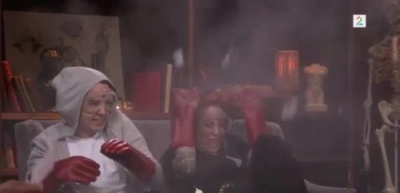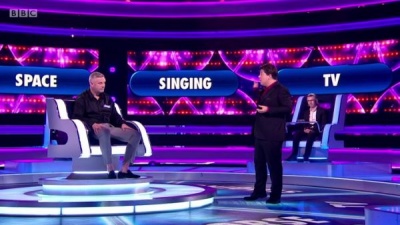Weaver's Week 2022-10-23
Last week | Weaver's Week Index | Next week
This week, we look at one of the shows nominated for a Rose d'Or.
Our programme is in Norwegian, and sadly our Norwegian has never progressed much beyond "L. O.! V. F. T. V. 4. U.!" So we're going to watch the show in translation, using someone's prepared subtitles. And we have a content warning: this week's review features contestants getting electric shocks. If this isn't your bag, skip right down to "A second subject".
Contents |
Huskestue
Seefood TV for TV 2 Norge, since 2015. Our sample episode is from 12 March 2017
Two contestants, one host, all in a lush study set. It's the ambience House of Games (3) would go for, if it could afford wood panelling and a proper mantelpiece.
Our sample episode (indeed, the only one we can find easily) stars Vegard Ylvisåker, You'll know him from his novelty hit "What does the fox say?" and (allegedly) "Give that wolf a banana". We learn that Vegard has recently bought an embroidery kit, one that's controlled by a computer. Isn't that cheating? No danger of pricking your thumb, no danger of getting the proportions slightly wrong.
Mr. Ylvis plays against Dag Otto Lauritzen, a professional cyclist active in the 1980s and early 1990s. His biggest career wins came in the 1989 Tour du Pont in New York and Baltimore; and the 1992 Tour of Norway, and he now works as a television commentator. And he works on this show – Dag Otto is a regular on this programme, along with host Kristian Ødegård.
Two subjects are picked by the show's computer. This week's topics are Norwegian politics, and modern technology. "The questions are so easy that you won't get points for a correct answer, only 3 points away if you are wrong." There's a three-second limit for answers, and Dag Otto's first answer is too late to count. After three questions each, Vegard has the lead by minus 3 to minus 9.
So far, this programme is very blokeish. The host is a middle-aged man, one of the players is a middle-aged man, the other player is a young man.
Enter, stage front, two actual women. Marion Ravn and Silya Nymoen. Marion is a voice actor and used to be half of pop group M2M; Silya is the singer-songwriter from popular jazz band Silya & the Sailors. Silya's working with Vegard from Ylvis; Dag Otto is working with Marion, who says she hates quizzes.
All four players have a "motivational band" on their lower arm, which delivers a small electric shock. The host asks a question, and someone buzzes in. Get it wrong, your team-mate receives a buzz from the band. Right answer? The other team get shocked. The shocks are small and brief, a shriek-inducing retort doing no lasting damage. It had better not, Silya's a professional pianist.
The "buzzer" for this round is a single bell, on a table between the two teams' sofas. Press the button on top, ring the bell, give your answer. Questions are quite hard to an outsider. "What's the name of the rule that prevents the oil fund from being overspent?" Some are easier, "What can the opposition parties do if they think the government's useless?" Say it's a day ending in -G, probably.
Next comes a round about political scandals, introduced by some film of politicians punching each other in the chops. To illustrate the point, the technicians have built the Slap-In-The-Face machine. A gloved hand rotates and delivers a sharp slap to the cheek of the contestant, who has put their chin on a plinth. It's a very Heath-Robinson contraption, more moving parts than are necessary, but that means it looks good on telly.
What was this minister doing? Playing Pokemon Go in parliament. (Which reminds us, we've still not seen any sort of game show format loosely based on Pokemon Go. What have our developers been thinking of?)
We're now about twenty minutes in, half-way through the show, and it's time for a commercial break.
A second subject
After the break, a change of subject. We've had quite enough domestic politics, let's take the modern technology questions. Again, we start with some very easy questions: nothing for a correct answer, two away for an error. Dag Otto watches his films in Adobe Acrobat, and Silya watches television in a ratio of 4:4. Square!
The first forfeit round is "pass the dotcom bubble". It's a grey balloon, slowly inflating. Pass it on when you give a correct answer, and – like shares in Altavista – you don't want to be holding it when it goes pop because you'll score nothing for the round. More incorrect answers, and everyone's wearing safety gear – goggles, ear defenders, and long gloves. Dag Otto seems to have been booked for his lack of knowledge, Marion for her fear of the balloon, literally hiding behind the cyclist at one point.
The second round involves some sort of electronic "spin the bottle" – a box with lots of wires on it, and it'll light up on a band around players' heads. They're picked to identify pictures – a Tamagotchi, a merged picture of Steve Gates and Bill Jobs. Vegard from Ylvis recognises Donkey Kong just from the chirrups made by someone playing it, and that's absolute genius.
Kristian Ødegård is the host, he delivers the script in a calm manner, doesn't get excited. When he's explaining the rounds, he comes across like a teacher who doesn't quite believe that he's got to explain how charcoal filters water again, and certainly can't believe that he's got to do it with this contraption.
More than dry questions
All of this brings us to the practical skills test. Knowledge will only get you so far, sometimes you've got to be able to apply it in real-world situations.
The first challenge is the none-more-2017 tech of a selfie stick. This was a device to hold a mobile phone while you took a picture; the challenge also asked to send the snap to the host by SMS. Dag Otto's team managed to send the text correctly, Sylve and Vegard sent it to the wrong number.
The next challenge is to find the third verse of "Ja vi elsker", put it in a document with specific formatting, and print it out on the printer by the host. Vegard turns out to be able to wangle Word and the web faster than anyone else. Since the original broadcast, Dag Otto has had five years to complete the task and is probably still doing it.
Finally, the game ends with a test to make sure the knowledge remains. It's the memory round. Change the lights. One team-mate asks questions to the other. Five correct answers ends the round, and the faster team wins the five points.
Anything that's come up during the show is fair game for questions in this round. The questions they asked, the correct answers, the discussion around those topics, complete red herrings. Unlike Richard Bacon's I Literally Just Told You, the questions are pre-written before the programme, so tend not to refer to unexpected detours; there are no obvious sketches to provide extra question fodder.
And that's the game. It's a light-hearted show, contestants are able to show what they know, and make light of what they don't know. The forfeits add an extra level of absurdity to the situation, especially when they're low-tech and require the stars to cooperate in their own minor humiliation. We can see why Huskestue has been nominated for a Rose d'Or, it's about the right level of embarrassment and daftness.
Could this programme work over here? If you'd asked us three years ago, we'd have said yes. Now, perhaps not. As we've mentioned, I Literally Just Told You has cornered the market in memory rounds, so that no longer seems as original. The slightly-disappointed schoolmaster host screams Richard Ayoade, but he's got the entirely successful Question Team, which gets its laughs from silliness rather than minor humiliation.
Yes, Huskestue could work over here, but it may not be a success. We wish the show well at the Rose d'Or. Just being nominated is a success, as it brings your programme to international attention and gets you reviews you might not otherwise have had.
In other news
We had hoped to bring a report from MIPCOM, the annual festival of television was held in Cannes. Sadly, there's not much to report – broadcasters seem to have retreated to familiar formats, pretending to be something you're not, and yet more dating shows. Before the end of the year, we plan to discuss The Mole on Netflix, The Genius on NPO3, and Make Me Prime Minister on Channel 4.
Now we are 37 A slightly smaller Eurovision Song Contest in Liverpool next May, with 37 entries expected. Four broadcasters have withdrawn – BNT ("Bulgaria" on screen), MKRTV ("North Macedonia"), RTCG ("Montenegro"), and RTBF ("Belgium"). VRT return for Belgium, where Dutch and French broadcasters alternate. There are no debutants, and no other returning broadcasters.
What's happened? Eurovision was always associated with a particular management group at BNT, they've all moved on to bigger and/or better-paid things, and the replacements don't see Eurovision as a priority. Both MKRTV and RTCG have said they couldn't afford to take part – entry fees have risen because RTR ("Russia") have withdrawn from civilised society. MKRTV might have been further deterred when their contestant was denied a visa to perform at the London pre-party in April.
We've also heard that the BBC and Ukraine's broadcaster UA:PBC have signed a Memorandum of Cooperation about next year's contest. They'll work together on stage design and backing music. Locations and cultural elements from Ukraine will appear in postcards and the other film inserts. And the broadcasters will work together to pick some hosts representing the best of their staff. No word – yet – on whether Paul McCartney's agreed to perform a mass singalong, contestants and stars on "We all stand together"
"Please, make it stop!" shouted the Radio Times reviewer. What could possibly have roused their ire? Could it be ITV's incessant round of news, soaps, soap news, news about soaps, and adverts for soupy soaps? BBC1's flop show "Unwatchable", so bad they dropped it in favour of "People Shouting at Each Other"? No.
The best-selling magazine got its listings in a twist about the music on The Wheel! C'mon, the music is the element to bind the show together, a joyful explosion of noise and zip, a welcome break from Michael McIntyre's monologue. If you take the music out of The Wheel, it's like taking the staples out of the Rusty Old Radio Times. Before we know it, we'd be chasing glossy pages of listings down the high street in a strong wind!
That said The Wheel feels like the wrong programme at 5.30, especially before the clocks go back. Maybe our opinion will change next month.
This week we learned
- Someone actually got a patent for the coathanger! Lots of people, in fact – Albert North in the 1860s, Schuyler Hulett in 1932 added cardboard to the wire frame, and JH Batts the moulded plastic hanger in 1967. (Mastermind)
- "L'esprit de l'escalier" – literally staircase wit – is when you think up a witty point some time after the right moment has passed. (Last week's BBC Brain)
- Emilia-Romagna is a region of Italy, around Bologna, Parma, and Ferrara. The Doctor Who companion was Romana. (University Challenge)
- They put Bluetooth connections into anything. Even barbecues. Yes, you can pay tribute to two medieval kings at once: the one called Bluetooth, and Alfred who turned all his food into inedible cinders. (Fingers on Buzzers)
Quizzy Mondays began with Mastermind, and Holly Franklin won the heat after a perfect round on the sitcom Ghosts. No mention of Bamber Gascoigne, who inherited the real Button House some time before his death. Lisa Sedge enlightened us about Elizabeth Woodville, a courtesan of the 15th century.
Only Connect went down to the buzzer, as the Croot Family beat the Irregulars by 21-19. The Sherlock Holmes fans could have won if they'd got the last Missing Vowels, but it was a toughie. The characters on Ghosts put in their second appearance of the night, there was dodgy music by Five Star and The Steve Miliband, and we were reminded of the Fourth Plinth mania of 2009.
University Challenge also went down to the buzzer, Sheffield and UCL drew 170-170. Rounds included Isabellas in history, cities built on reas, the life of Cezanne, Pueblo culture, and things called "Thunderbolt". The game took a geographic turn to the end, with capitals of French départements and the cities of Emilia-Romagna.
The UCL team featured the first mother-and-son pair ever to play on the same team: Louis Collier is taking a PGCE teaching qualification, Rachel is studying for a PhD in the history of ancient Greek. Hope she got some "I was there" memories from young Paxman.
Don't forget Quizzy Monday is having an excursion, anything to avoid the rugby league world cup. Only Connect and University Challenge take a day-trip to Tuesday, and Mastermind a long-haul to Wednesday. The week after, it's Quizzy Monday: Tuesday Edition, all three shows on 1 November.
This week, new episodes of Family Fortunes (ITV, Sun), and we finally get to see One Man and His Dog (BBC1, Sun). Something new, Riddiculous (ITV, weekdays) promises questions and braintwizzlers, thanks to Henry Lewis from The Goes Wrong Show.
A few other well-loved shows return – Dress to Impress (ITV2, weeknights), Don't Hate the Playaz on ITV2 (Wed), and Gwrach y Rhibyn dodges the witch on S4C (Thu).
Pictures: Seefood TV, EBU, Hungry McBear, West Horsley Opera.
To have Weaver's Week emailed to you on publication day, receive our exclusive TV roundup of the game shows in the week ahead, and chat to other ukgameshows.com readers, sign up to our Google Group.


